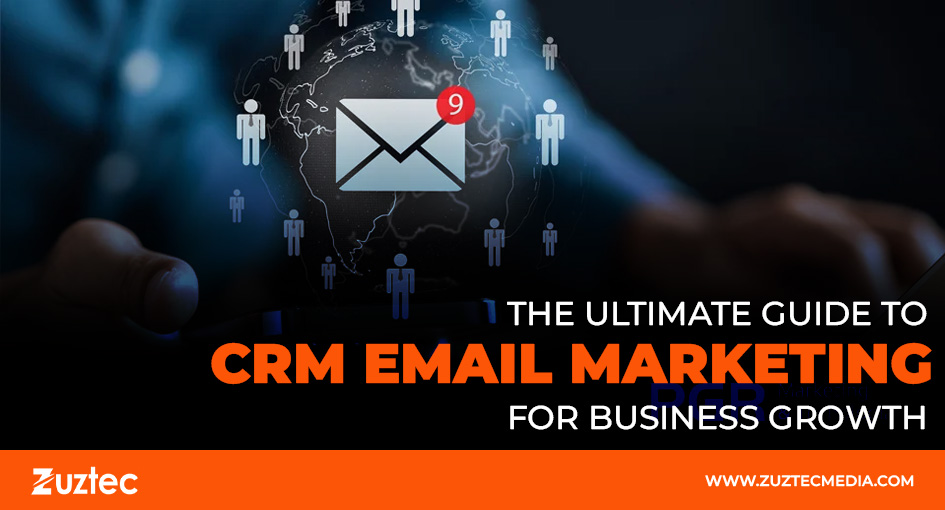
The Ultimate Guide to CRM Email Marketing for Business Growth
In today’s digital landscape, businesses rely heavily on email marketing to engage customers, nurture leads, and drive sales. However, sending generic emails to a broad audience is no longer effective. Customers expect personalized, timely, and relevant communication. This is where CRM email marketing plays a crucial role in business growth. Customer Relationship Management (CRM) email marketing integrates CRM software with email campaigns, allowing businesses to track customer interactions, segment audiences, and automate communication. Unlike traditional email marketing, CRM-based email marketing enables businesses to send targeted emails based on user behavior, preferences, and engagement history. This personalized approach increases open rates, click-through rates, and conversions, leading to stronger customer relationships and higher revenue.
By leveraging customer relationship email marketing, businesses can efficiently manage leads, automate follow-ups, and track email performance in real time. Whether one runs a small business, an e-commerce store, or a B2B enterprise, a well-implemented customer relationship email marketing strategy can enhance customer retention, improve sales processes, and maximize ROI. This guide will walk the reader through the essentials of customer relationship email marketing, from selecting the right CRM software to implementing automation and segmentation strategies. By the end of this article, readers’ll have a clear roadmap to optimize the email campaigns and achieve sustained business growth.
What is CRM Email Marketing?
Customer relationship email marketing refers to the use of customer relationship management (CRM) software to streamline and personalize email marketing campaigns. Unlike traditional email marketing tools, a CRM system collects customer data, tracks interactions, and automates email workflows, enabling businesses to send highly targeted and personalized emails.
Key benefits of customer relationship email marketing include:
- Improved customer segmentation based on behavior, demographics, and purchase history.
- Automation of email workflows for lead nurturing and follow-ups.
- Enhanced tracking and analytics to measure email performance and optimize campaigns.
By leveraging customer relationship email marketing, businesses can maintain stronger customer relationships, increase engagement, and drive higher conversion rates.
How CRM Email Marketing Boosts Business Growth
1. Personalization at Scale
CRM software allows businesses to personalize emails based on customer data. Personalized subject lines, dynamic content, and tailored offers increase email engagement and customer satisfaction.
2. Automated Lead Nurturing
Customer relationship email marketing automates lead nurturing by sending targeted emails at the right time. Automated sequences can welcome new subscribers, remind users about abandoned carts, and re-engage inactive customers.
3. Improved Customer Retention
Regular communication with customers through personalized emails helps businesses maintain relationships and encourage repeat purchases. CRM systems track customer interactions to send timely follow-ups and exclusive offers.
4. Higher Conversion Rates
Segmented and targeted email campaigns lead to higher conversion rates. Businesses can send relevant product recommendations, discounts, and reminders based on past customer behavior.
5. Efficient Sales and Marketing Alignment
Customer relationship email marketing bridges the gap between sales and marketing teams. Sales teams can access real-time data on customer interactions, allowing them to tailor their approach and close deals more effectively.
Key Features of CRM Email Marketing Tools
To maximize the benefits of customer relationship email marketing, businesses should look for tools that offer:
- Email Automation: Schedule and send personalized email sequences automatically.
- Contact Segmentation: Group customers based on behavior, demographics, and interests.
- Behavioral Tracking: Monitor email opens, clicks, and website interactions.
- A/B Testing: Optimize subject lines, content, and call-to-action (CTA) buttons for better engagement.
- Detailed Analytics: Measure email performance, track conversions, and improve strategy.
Popular customer relationship email marketing tools include HubSpot, MailChimp, ActiveCampaign, Salesforce, and Zoho CRM.
Best Practices for Customer Relationship Email Marketing Success
1. Segment Your Audience
Use CRM data to segment email lists based on customer behavior, preferences, and lifecycle stages. Send targeted emails to improve engagement and conversions.
2. Leverage Automation
Automate workflows for welcome emails, abandoned cart reminders, re-engagement emails, and post-purchase follow-ups to save time and enhance the customer experience.
3. Personalize Email Content
Use customer names, past purchases, and browsing history to craft personalized emails that resonate with recipients. Personalized emails increase click-through rates and sales.
4. Optimize for Mobile Devices
Ensure emails are mobile-friendly with responsive designs, concise text, and clear CTAs to improve readability and engagement.
5. Test and Analyze Performance
Run A/B tests to compare subject lines, content, and CTAs. To improve upcoming efforts, examine conversion data, click-through rates, and open rates.
6. Maintain Email List Hygiene
Regularly clean your email list by removing inactive subscribers and updating contact details to improve deliverability and avoid spam filters.
Career Growth and Opportunities in CRM Email Marketing
With businesses increasingly relying on data-driven marketing, customer relationship email marketing has become a valuable skill for digital marketers. Professionals with expertise in CRM software, automation, and email campaign optimization can pursue careers in:
- Email Marketing Specialist: Focus on designing and managing email campaigns.
- CRM Manager: Oversee CRM software, customer segmentation, and data analytics.
- Digital Marketing Manager: Implement customer relationship email marketing strategies within broader marketing campaigns.
- Freelance CRM Consultant: Help businesses set up and optimize customer relationship email marketing systems.
By staying updated with the latest CRM technologies and email marketing trends, professionals can unlock high-paying opportunities in the digital marketing industry.
To sum up, CRM email marketing is a powerful tool that helps businesses build stronger relationships, improve customer engagement, and drive sales. By integrating CRM with email marketing strategies, companies can automate workflows, personalize communication, and optimize email performance for maximum impact. To succeed with customer relationship email marketing, businesses should focus on audience segmentation, automation, personalization, and continuous testing. Whether you’re a small business owner, marketer, or entrepreneur, implementing an effective customer relationship email marketing strategy can lead to long-term business growth and increased revenue. Start leveraging customer relationship email marketing today to enhance customer experiences and boost your business success!

